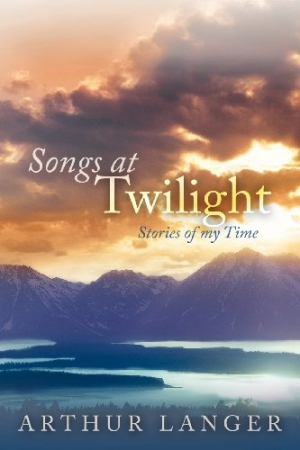Songs at Twilight
Stories of My Time
“Who the hell would be interested in reading my memoirs?” asks author, songwriter, and playwright Arthur Langer in Songs at Twilight: Stories of My Time. With an eye to avoiding “the burden of minutiae which most likely could put the reader to sleep,” he has set his reservations aside and published some of the many “boyhood stories, family stories, travel stories and theatre stories” that represent “the landmark episodes” of his life. Langer is a solid, entertaining writer, and the majority of the stories he shares range from the poignant to the downright funny. A New York Times crossword puzzle enthusiast, he has an impressive command of words and a delightful way of putting them together. Ever curious, and with a flair for the dramatic, he tells his tales exactly as he recalls them unfolding, never ceasing to wonder at “what makes people tick.”
Some of Langer’s best tales involve his family. From a grandmother who locks her husband’s dinner in the sideboard whenever she’s angry with him to a bootlegging uncle forced to give up the “spirits business” when confronted by Dutch Schulz himself, Langer admits that he grew up with his share of odd relatives. His family tree, he notes, grew “nothing but nuts.” Still, like his much-admired grandfather before him, he seems both willing and able “to see the amusing undercurrents in people and events” and applies that perspective in cheerfully telling his family stories. Having searched as a youth for “some kind of relevance” to his own “pedigree,” he has by now accepted the peculiarities in his lineage and writes humorously, if not always kindly, about even the most eccentric among his relatives.
Langer also relates some especially touching tales about life on the streets in the Brooklyn of his youth. As a Dodgers fan and “autograph hound,” he spends countless hours at Ebbets Field, and one story he recounts about confronting an egocentric Dodgers player is telling. He refers to it as a “growing up all at once” event, and the lesson he learns from it colors his outlook on both vanity and celebrity from that point forward, which is particularly relevant in his later life in the theater.
A major portion of Langer’s book deals with his years in the theater as a writer, producer, and general manager. His tales of show business lack the ease and familiarity of his earlier stories and will undoubtedly appeal most to those with a strong interest in musical theater. All the same, Langer displays great commitment to his craft, whether summarizing the one-woman show he wrote for a special friend or discussing the musical that was so costly it went “right from the typewriter and piano into the trunk,” never to be produced on stage.
Songs at Twilight ends with a chapter titled “Life Is Just A Bowl Of Cherries.” It is an apt sentiment for the memoir Langer has written and undoubtedly for his life itself.
Reviewed by
Cheryl M. Hibbard
Disclosure: This article is not an endorsement, but a review. The publisher of this book provided free copies of the book and paid a small fee to have their book reviewed by a professional reviewer. Foreword Reviews and Clarion Reviews make no guarantee that the publisher will receive a positive review. Foreword Magazine, Inc. is disclosing this in accordance with the Federal Trade Commission’s 16 CFR, Part 255.

